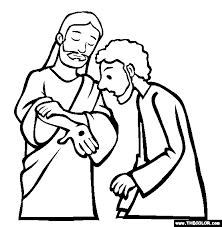John 20:19 – On the evening of that day, the first day of the week, the doors being locked where the disciples were for fear of the Jews, Jesus came and stood among them and said to them, "Peace be with you."

Back in chapter 19, John gives us the testimony of several eyewitnesses who confirmed that Jesus was undeniably dead after his crucifixion. In chapter 20, he gives us the testimony of several eyewitnesses who saw, touched and spoke to our resurrected Lord. So far, we have studied the testimonies of Mary Magdalene and the apostle John.
In today's post, we find the testimonies of more people who interacted with Jesus after he was raised from the dead.
In the early morning of 'that day', Mary and her friends went to the tomb before sunrise and found it empty. By midday, all the disciples had heard that Jesus was risen, although not all of them had seen him.
But he had been seen by the other women who came to the tomb (Matthew 28:9) and two other believers who were on their way to Emmaus (Luke 24:13).
It would appear as though the Jewish religious leaders were also coming to grips with the fact that something had happened. The Roman guards had reported seeing angels, who rolled the stone away from the tomb. They accepted a bribe from the Jewish leaders to keep quiet about what they saw (Matthew 28:11-15).

In light of that news, some of the priests and Pharisees would certainly have gone to the tomb to see what was going on; it was in their best interest to know what they were facing. They certainly would have desired to put their own 'spin' on this news before it reached the general public.
All things considered, it seems logical that we find the disciples gathering that same evening to discuss this news, to consider what might happen in the near future, and to worship God. Because it was only a few days after the crucifixion, they were all still very much afraid of the Jewish leadership. For all they knew, they were going to be the next targets of their wrath.
At some point in that meeting the unexpected happened - Jesus appeared! Please note: There is nothing in the text to suggest that he miraculously appeared out of thin air.
He probably just opened the door and entered the room, the same as everyone else. But because of his unexpected appearance and because most of them had not yet seen him alive, they were alarmed or fearful when they saw him. The fact that they had abandoned him just before his death probably didn't help either.
As we see multiple times in the scriptures, God does not want his followers to be fearful. Jesus addresses them by saying 'shalom' or 'peace be with you' which was a very common greeting at the time.
'Shalom' is an interesting Hebrew word. It denotes all the peace, cheerfulness and prosperity desired to live a happy life. We could rephrase it like this: 'May you be well and prosperous' or 'May every blessing of heaven and earth which you need be granted to you'.
The overall meaning is very clear – much to the disciples relief, Jesus has not come to condemn them; he has come to them as a friend and brother.
John 20:20 – When he had said this, he showed them his hands, and his side. Then the disciples were glad when they saw the Lord.
When Jesus rose from the dead, he retained the same scars he had in life. He showed the disciples the wounds in his hands, feet and side (Luke 24:38-39). This was irrefutable proof that he was the same being who had suffered and died by crucifixion, and he had truly risen from the dead just as he promised.
In that instant, all the grief and sorrow of the disciples simply melted away. It was replaced with incredible joy as they were reunited with Christ, and their faith was confirmed within them.
John 20:21 – Jesus said to them again, "Peace be with you. As the Father has sent me, even so I am sending you."
Once all of the disciples had a chance to verify this was really Jesus, our Savior once again gives them a salutation of peace and blessing. Thus, he assures them that they have been forgiven and reconciled to him, despite the fact that they abandoned him in his hour of suffering and death.
Not only has Jesus forgiven them, he also proceeds to commission them to continue his work, in his authority. They are his ambassadors, going forth in his name and establishing the kingdom of heaven in the world. They will be the ones to continue preaching the gospel (while confirming it with signs and wonders), baptizing new converts and making disciples of the nations.
 Using the authority Christ has given them, the apostles will establish and organize the church. They will declare the fullness of God's love and show the way to peace/reconciliation with God (II Corinthians 5:18-20). In essence, Jesus has declared them to be pastors, teachers and evangelists (Ephesians 4:11-12).
Using the authority Christ has given them, the apostles will establish and organize the church. They will declare the fullness of God's love and show the way to peace/reconciliation with God (II Corinthians 5:18-20). In essence, Jesus has declared them to be pastors, teachers and evangelists (Ephesians 4:11-12). Because they carry on the work he started, the disciples of Christ can expect the same treatment he received – at times they will be persecuted and at times they will be accepted. At times they will be revered/honored and at times they will be cursed. At times people will accept the gospel and at times they will reject it.
We too continue to work under the same commission as the disciples. Jesus has set us apart for the very same purpose (to spread the gospel), clothed with the same authority and empowered by the same Holy Spirit.
John 20:22 – And when he had said this, he breathed on them and said to them, "Receive the Holy Spirit."
This is a most unusual verse. We know that the followers of Jesus did not receive the indwelling Holy Spirit when Jesus breathed on them, because the gift of Holy Spirit had not yet been given. That could not occur until Jesus had ascended to heaven and been glorified (John 7:38-39, John 16:7). Furthermore, we have a very detailed account of the coming of Holy Spirit in the book of Acts.
So, what was happening here?
Jesus was giving his followers an outward physical sign of an inward spiritual change that was shortly to take place. This is a technique often used in scripture. A similar example would be water baptism. Believers are to be baptized in water (Matthew 28:19). The act of being baptized is an outward physical sign of the repentance/cleansing that has taken place in the invisible heart of the believer.
In this case, the act of breathing on the apostles was an outward sign/pledge which represented the invisible nature and influence that would come upon the disciples when they received Holy Spirit. It also clearly identified the source of the Spirit and all his gifts/workings – Jesus himself. Sadly, many Christians have attributed the works of the Spirit to Satan, because they seem unusual or because they have been given incorrect teaching.
The word John uses for 'breathed' only occurs once in the New Testament. It is the same word used in Genesis when God 'breathed' the breath of life into man's nostrils, and he became a living being:
Genesis 2:7 – Then the Lord God formed the man of dust from the ground and breathed into his nostrils the breath of life, and the man became a living creature.
Just as the breath of God breathed natural life into our physical bodies, the breath of Jesus breathed Holy Spirit life into our spiritual man. Once we accept Christ as savior, Holy Spirit resides in our hearts, enabling believers to accomplish the spiritual agenda God prepared for us.
We can clearly see the result of Holy Spirit's work in the lives of the apostles.
Just after the crucifixion, we find the apostles uncertain and afraid. Despite having been the interns of Jesus for three years, they are still ignorant of the true meaning of scripture. They were not yet qualified to establish and govern the church, or to fully explain and share the gospel message. They would have immediately crumbled if faced with persecution.
However, once they had been filled and baptized with the Spirit (Acts 2), we see a complete change in the apostles. They became confident and courageous. Because of the illumination of the Spirit, they could accurately interpret the scriptures. They received wisdom and authority to establish/govern the church. They were bold and fearless in the face of persecution, preaching the gospel at every opportunity. Clearly, because of Holy Spirit, they were now enabled to accomplish the work which God had commissioned them to do.
John 20:23 – "If you forgive the sins of any, they are forgiven them; if you withhold forgiveness from any, it is withheld."
We need to be very careful how we interpret this particular verse. It is an irrefutable fact that God alone can forgive sins. It would be blasphemous and absurd to say that any ordinary man (created creature) could absolve the guilt associated with a sin against our Creator, God.
Isaiah 43:25 – I, I am he who blots out your transgressions for my own sake.
In other words, God has the authoritative or magisterial capacity of forgiving sin. This authority belongs to him alone.
What Jesus is giving the apostles is the ability to sanction forgiveness in a ministerial capacity. Let me explain.
To begin with, let's look at the context of the statement Jesus made. Two things should specifically be noted.
First, the statement is spoken immediately after Jesus has conferred Holy Spirit upon the disciples (verse 22). This implies that it is not the disciples, but Holy Spirit within them, who can remit sin.

Second, it was spoken after Jesus commissioned the disciples to carry on his work of spreading the gospel (verse 23). This implies that the disciples were not sent into the world to condemn it, but to bring/reveal the light of the gospel so mankind could be saved.
The meaning of this passage is that Holy Spirit, working through the disciples, would determine/establish/make known the terms and conditions under which people could receive forgiveness during the age of grace. Establishing those conditions was part of the apostle's responsibility in instituting the church. However, the requirements were not of their own choosing; the requirements were given to them by Holy Spirit.
Because the conditions of forgiveness are clear, every believer can have a personal assurance of forgiveness when they comply with the requirements (Acts 2:38, Acts 16:31, etc).
Thus, in a ministerial capacity, the disciples could assure/declare to someone that their sins were forgiven. Again, this is different from the authoritative or magisterial forgiveness of sin, which comes through Christ alone.
Simply stated, the only power of forgiving sin that man has, is to declare that if a person is truly penitent, their sins are forgiven because of/through the work of our Redeemer. The purpose of bestowing this ministry on the apostles is so that ordinary men and women who live during the age of grace (the church age) can be fully confident that their sins have been forgiven by God and they are truly reconciled to him.
John 20:24 – Now Thomas, one of the Twelve, called the Twin, was not with them when Jesus came.
We are not specifically told why Thomas was not with the other apostles. It may have been that his fear of the Jews was so great, he dared not come. Perhaps he had given up hope. Or perhaps his attention was diverted by the demands of his family.
What we can say for sure is that he really missed out on a blessing by not attending the meeting that day.
Likewise, as Christians we are specifically told to regularly meet together (Hebrews 10:25). The reasons for this are many:
- You will have an opportunity to anoint and pray for others.
- You will have an opportunity to encourage/strengthen your spiritual family through your testimony.
- You will have an opportunity to engage in corporate worship and praise.
- You will have an opportunity to teach or instruct new believers.
- You will have an opportunity for the gifts of Holy Spirit to flow through you.
- You will have an opportunity to give your tithes and offerings in obedience to the word of God.
- You will have an opportunity to form new friendships/relationships.

The list goes on and on!
Here is something to keep in mind: By missing the meeting, Thomas not only deprived himself of the chance to minister to others, he missed the chance to be ministered to himself. Had he shown up that day, his colleagues would have encouraged him in his faith and he would have had a chance to see Christ for himself!
Are you a regular in-person church attendee? If not, you are not only missing opportunities to strengthen the local body of Christ, you are depriving yourself of receiving blessings from God. Please, please, please - get plugged into your local church now!
John 20:25 – So the other disciples told him, "We have seen the Lord." But he said to them, "Unless I see in his hands the mark of the nails, and place my finger into the mark of the nails, and place my hand into his side, I will never believe."
The ten disciples who had seen Jesus hastened to report these events to Thomas. We can easily imagine their excitement as they give him a full account of what transpired at that meeting.
This information was not hearsay or rumor or even a third-party account. It was actually a testimony – a firsthand account of what they personally experienced with Jesus!
All Christians have a testimony. Each one of us should be able to give others a firsthand account of how Jesus has impacted our lives, forgiven our sin, and given us hope for the future.
Your personal testimony is one of the most powerful witnessing tools you have. You can easily and naturally share it with others during the normal course of everyday conversation. It gives others a genuine example of the impact Christ can have in the life of any individual. It will draw them to the Lord.
What is your testimony? You should consider rehearsing yours. I recommend writing it down and organizing it in such a way that you could share your life story in five minutes or less. By preparing in advance, you will be able to stay on topic and keep the attention of your listener long enough to share. Don't be caught off guard – have your testimony ready!
Sadly, despite hearing the testimony of his reliable colleagues, Thomas is still skeptical that Jesus is alive. Furthermore, he demands physical proof of the resurrection – he wants to see the scars in Jesus' hands and side. Unless he receives this evidence, he refuses to believe.
Thomas is often criticized for his unbelief (as well he should be):
- He disregarded the words of Jesus, who repeatedly stated he would rise on the third day.
- He ignored the testimony of the other apostles, even though he knew them to be men of wisdom and integrity.
- He offended and discouraged his brothers by openly denying/disregarding the resurrection.
- He treated Christ and his word with contempt by saying he would only be convinced by a physical sign, instead of by faith. The unbelieving Jews had also asked for a physical sign, but they did not get one (Matthew 16:4).
It's only fair to point out that the other apostles also initially exhibited unbelief at the news of the resurrection, although their unbelief was quickly replaced by faith:
Mark 16:14 - Afterward he appeared unto the eleven as they sat at table, and rebuked them for their unbelief and hardness of heart, because they believed not them who had seen him after he was risen.
Let's beware of falling into the same error in our own lives, because unbelief is a sin which is very displeasing to God. If Jesus said it, it's true. If he promised it, you can count on it!
John 20:26 – Eight days later, his disciples were inside again, and Thomas was with them. Although the doors were locked, Jesus came and stood among them and said, "Peace be with you."
Instead of honoring the Jewish Sabbath, the disciples began to regularly meet on the first day of the week (Acts 20:7, 1 Corinthians 16:2, Revelation 1:10), which they called the Lord's Day. The current Christian tradition of meeting on Sunday was derived from this practice.
This time, Thomas is present in the group.

Jesus once again comes into the meeting and this time he condescends to the weakness of Thomas' faith – he offers to let Thomas touch his wounds. This does not mean that Jesus was pleased with his lack of faith; the opposite was actually true.
However, Jesus uses this event to prove to Thomas (and us) that he was the same Christ who had been crucified. The same wounds that were present on Jesus before he died were present when he rose from the dead. Because of this example we can place our faith in Christ with full confidence, knowing that he has indeed risen from the dead.
John 20:27 – Then he said to Thomas, "Put your finger here, and see my hands; and put out your hand, and place it in my side. Do not disbelieve, but believe."
Did you notice that when Jesus speaks to Thomas he uses the exact same words that Thomas had spoken earlier? By doing so, Jesus demonstrates that not only was he risen, but he possessed divine knowledge – he was conscious of the words and actions of men.
All it took was this one statement from Jesus to convict Thomas of his unbelief.
Thomas was the last apostle to have faith spring up within his heart; until Jesus reached out and convicted him, his faith was in danger of dying. Through the preaching of the gospel, Holy Spirit still convicts men and women today, leading them to eternal life in Christ Jesus (II Corinthians 7:9-10).
John 20:28-29 – Thomas answered him, "My Lord and my God!"Jesus said to them, "Have you believed because you have seen me? Blessed are those who have not seen and yet have believed."
The response of Thomas is immediate and forceful. It is a heartfelt statement of truth reflecting both his own stupidity and the majesty of Jesus.
My Lord: Thomas addresses Jesus as Lord; he acknowledges that Jesus is indeed the very same person that he had spent the last three years with - the very same person who had been crucified and buried, yet was now alive!
My God: Thomas also addresses Jesus as God; he acknowledges his divinity and pledges his undying submission to Jesus. From this moment forward, Thomas will worship him as God.
Thomas is the first of the apostles to address Jesus as 'God'. Notice that Jesus allows himself to be addressed in this manner. This is clear evidence of his divinity; for if Thomas was wrong, Jesus would have corrected him.
Jesus responds to Thomas by approving/confirming his faith. He now believed that Jesus had risen from the dead, but only because of what he could prove with his own physical senses. His faith would have been more excellent if he had believed without such evidence, because faith is the evidence of things not seen (Hebrews 11:1).
Jesus goes on to highly commend the faith of those who will believe in him by the preaching of the gospel without having seen the physical proof of his nail scarred hands. Jesus declares that this group of people (which includes you and me) are blessed.
John 20:30-31 – Now Jesus did many other signs in the presence of the disciples, which are not written in this book; but these are written so that you may believe that Jesus is the Christ, the Son of God, and that by believing you may have life in his name.
In these verses, John gives us the reason for penning his gospel. He gives us an eyewitness view of some of the things that occurred while Jesus walked the earth, so that we can feel confident about believing in Jesus as the Son of God and trusting him as our Redeemer.
Let me offer you some encouragement:
Holy Spirit, working through the apostle John, has given us plenty of evidence that Jesus died and rose again. If he is able to keep that promise, then we can be confident that every other promise he has made in his word can be trusted!
Scripture gives us other confirmations of God's faithfulness as well. For example, look at the testimony of Joshua son of Nun, after Israel finally possessed the Promised Land:
Joshua 21:45 - There failed not any of any good things which the LORD had spoken unto the house of Israel; all came to pass.
I encourage you to find and claim your promise in the scriptures, knowing that God is faithful to his word.
Let me offer you some relief:
We have seen that the disciples experienced some unbelief in their lives, despite being with Jesus for an extended period of time. Perhaps you too are experiencing some unbelief. While that is not uncommon, it isn't a good thing.
The unbelief of Thomas disappeared when he saw Christ. So, if you are stuck in unbelief, move into an extended time of praise, worship and prayer. Shut out all distractions and focus on God. Once you enter his presence and touch him again, your unbelief will fade.
Let me offer you some strength:
Once Holy Spirit came upon the followers of Christ, they were empowered with everything they needed to accomplish the tasks God prepared for them to do. The good news is that Holy Spirit has not changed (Malachi 3:6). He is dwelling in your heart right now, ready to assist you with wisdom, boldness, spiritual understanding and every other thing you need to fulfill your own personal mission on earth.
If you feel lost or stuck right now, don't waste any time – seek Holy Spirit immediately and receive everything you need!
